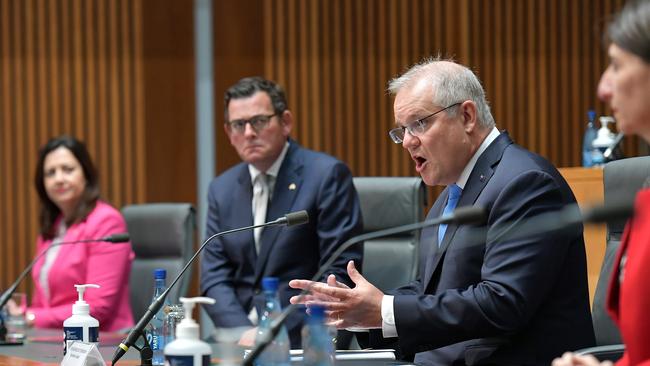Covid deaths endure in Australia, five years after the pandemic
Research shows undiagnosed Covid cases and the long-term health impacts of the pandemic have driven an enduring decline of life expectancy.

Covid is continuing to drive mortality rates in Australia five years after the start of the pandemic, new research shows, proving how undiagnosed cases and the long-term health impacts of the pandemic have driven an enduring decline of life expectancy.
Tuesday marks five years since the World Health Organisation declared Covid a pandemic, and a study by the Burnet Institute – which emerged as a clear authority on disease tracking in 2020 – has shown Australia has work to do keeping Covid from wreaking further havoc on the vulnerable.
It shows global life expectancy has declined for the first time in at least 70 years because of the pandemic. However, Australia’s excess mortality was far less severe than international counterparts that employed more relaxed or indecisive disease control strategies. Excess mortality tracks the disparity between expected deaths based on population health and reality using actuarial data.
The total between January 2020 and November 2024 sat at an estimated 31,000 deaths, but if Australia’s proportion of excess deaths were equal to the US and UK it would have reached 55,000.
Regardless, 20 more Australians are dying each day than before the pandemic due to Covid. It sits five times higher than the annual road toll, and 10 times higher than seasonal flu deaths.
Covid and health emergencies chief health officer at Burnet, Suman Majumdar, said the main causes for enduring excess deaths were undiagnosed Covid cases and long-term health impacts caused by the pandemic. He said more research was needed on how great an impact long Covid was having on the health and productivity of the nation.
“This is not all in the rear view mirror,” he said. “One area we haven’t focused on is long Covid and post-acute Covid, and that’s an area that requires an increasing response but also significantly more research to develop cures and treatments.
“There is a huge global impact from this and obviously we want to just forget about it and go back to where we were, but I think for us you really can’t.”
With an eye to death tolls overseas, the Burnet report argues inadequate global disease prevention infrastructure was laid bare by the pandemic, and more needed to be done to prepare for another pandemic in the future.
It comes as Australia’s public health groups push for a recommitment to the establishment of an Australian Centre for Disease Control, after the Albanese government established an interim agency after the 2022 election.
The CDC is not expected to be fully developed until the start of 2026, and the Coalition has made no promise to see its establishment through if elected.
“We have failed to fully capitalise on lessons learned during the last pandemic and build institutions to lead public health responses in future,” Australasian Society for Infectious Diseases president Joseph Doyle said.
“We need to ensure the interim CDC transforms into a well-resourced, transparently governed, expert and evidence-based permanent CDC to prepare us for emerging threats and ongoing public health challenges that occur every day.”
The Economist estimates the Covid death toll sits at 27 million internationally, with 3.5 million of those lives lost in the past year.
In Australia, immigrants, First Nations Australians and those living in lower income areas bore the brunt of the mortality burden.
Public Health Association of Australia chief executive Terry Slevin said a Coalition commitment to a CDC, or equivalent strategy, would cast off the “political veil” from a future pandemic response, ideally combating blows to public trust inflicted by stringent pandemic measures.
“Preventive health has been extraordinarily inconspicuous in budget announcements and in election promises. In almost all elections since the pandemic hit, we’ve seen bidding wars between the two major parties … and yet the CDC is the only substantive standalone commitment any government has made (to preventive health), state or federal, since the pandemic that stopped the world.
“We’ve dropped back into the focus of health as dealing with illness, not preventing it.”
The Burnet report found Australia’s “distinctive” pandemic strategy of lockdowns, border closures and track-and-trace testing all significantly reduced deaths and infections.
However, it argued the transition away from the “zero Covid” strategy had its pitfalls.
“Australia’s strategic transition from an aggressive suppression strategy to living with Covid with a focus on protection of those at highest risk in late 2021 and early 2022 revealed significant challenges,” the report reads.
“The emergence of the highly transmissible Omicron variant, and its subsequent sub-variants, which evaded the vaccination protection against infection, coupled with eased restrictions, led to widespread transmission and substantial excess mortality which continues to this day.”





To join the conversation, please log in. Don't have an account? Register
Join the conversation, you are commenting as Logout